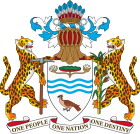 |
|---|
| Constitution |
This article lists political parties in Guyana. Guyana has a two-party system, which means that there are two dominant political parties. The main schism is not of ideology, but ethnicity; the People's Progressive Party is supported primarily by Indo-Guyanese people, while the People's National Congress is supported primarily by Afro-Guyanese people. [1]
